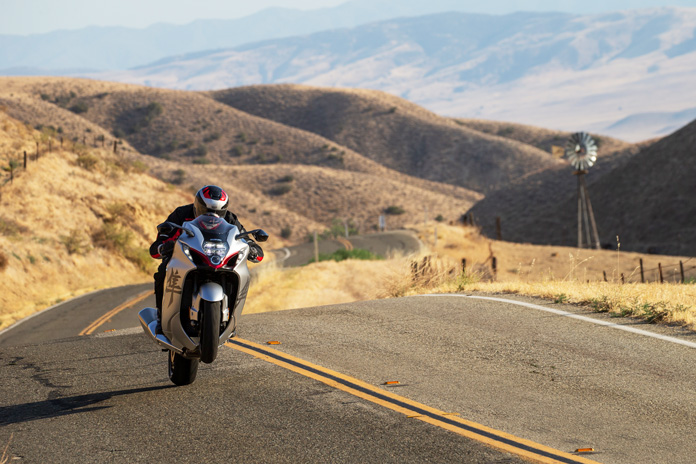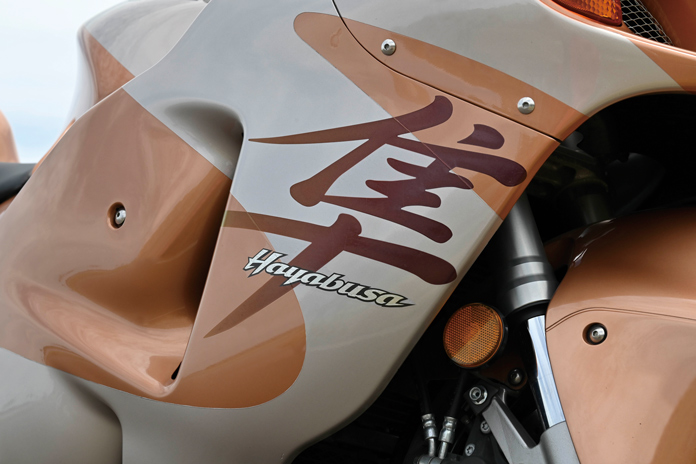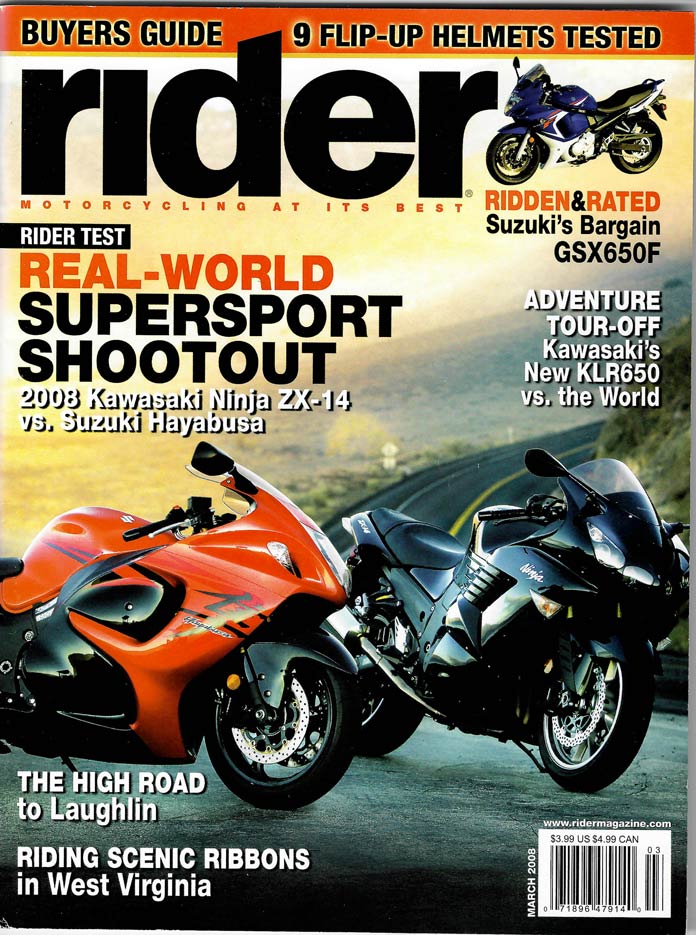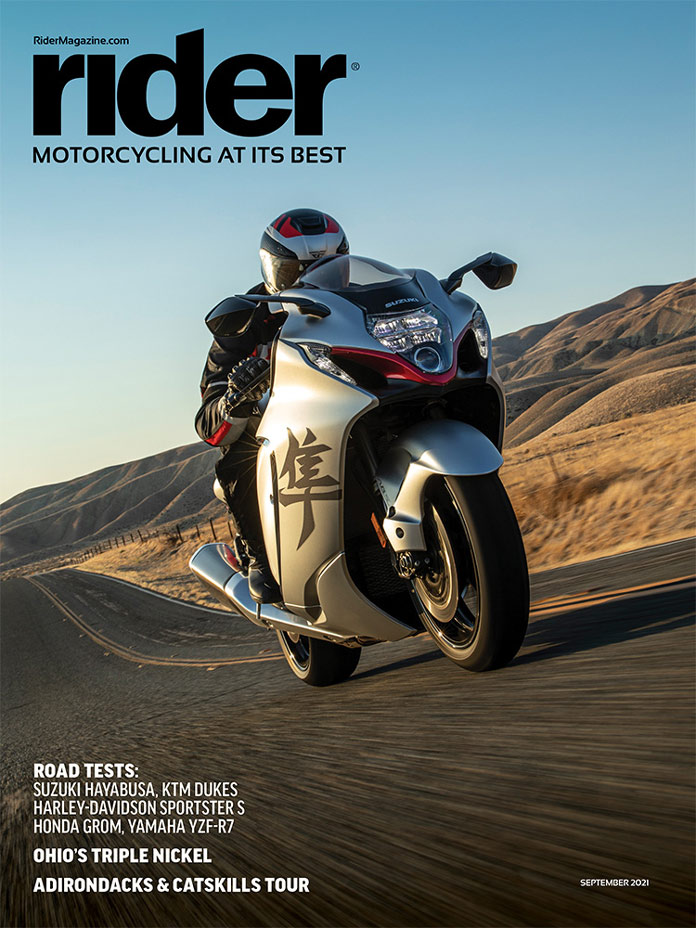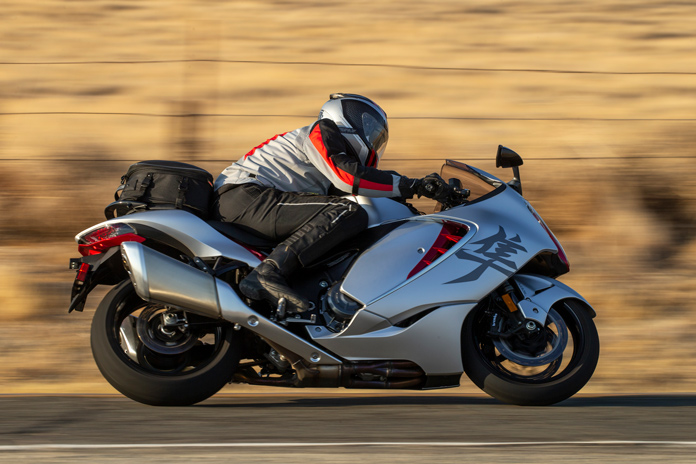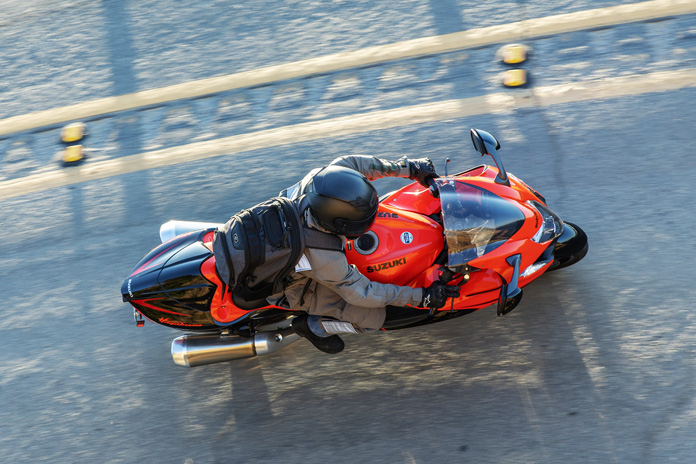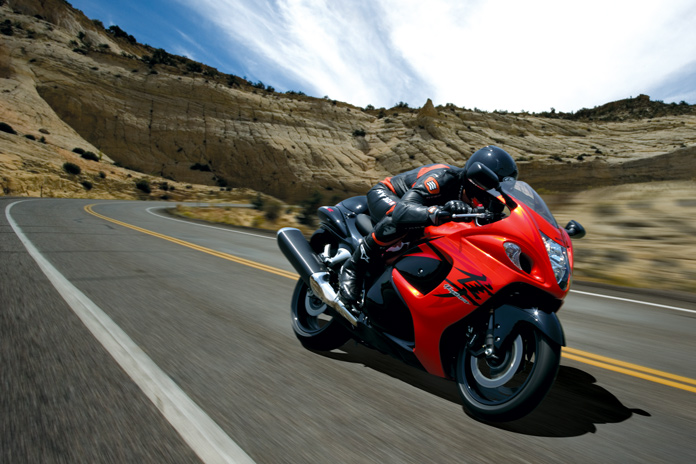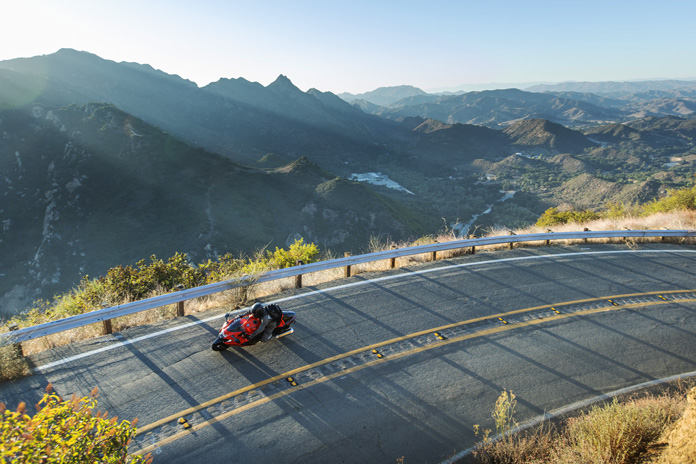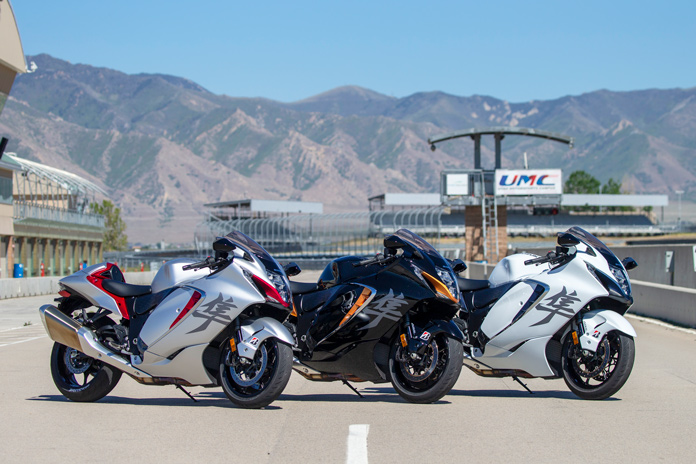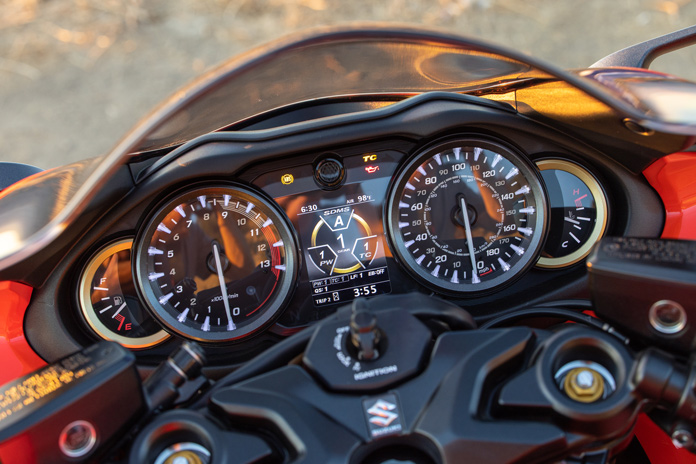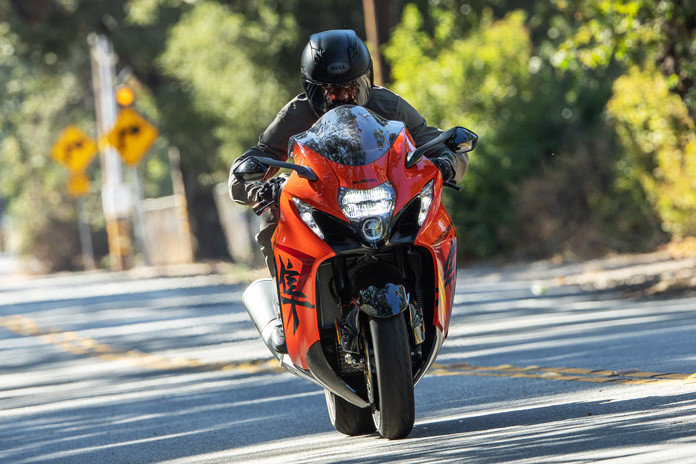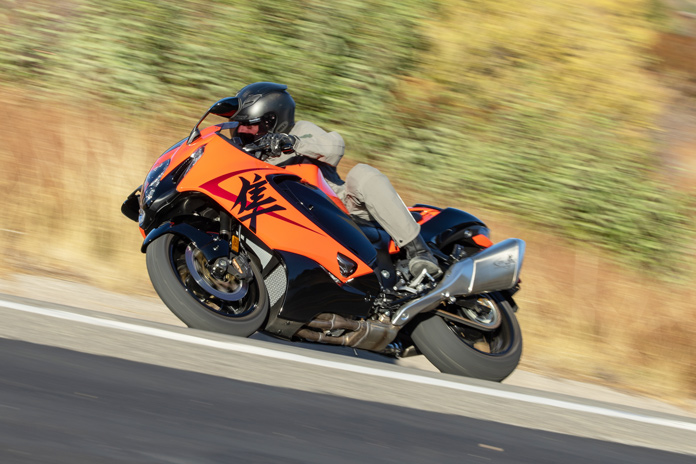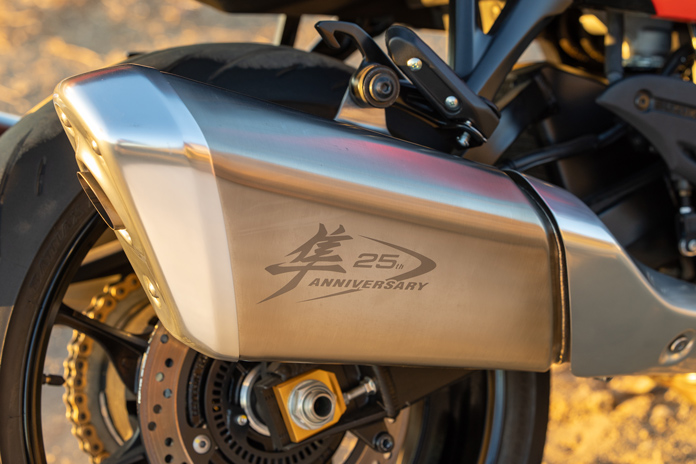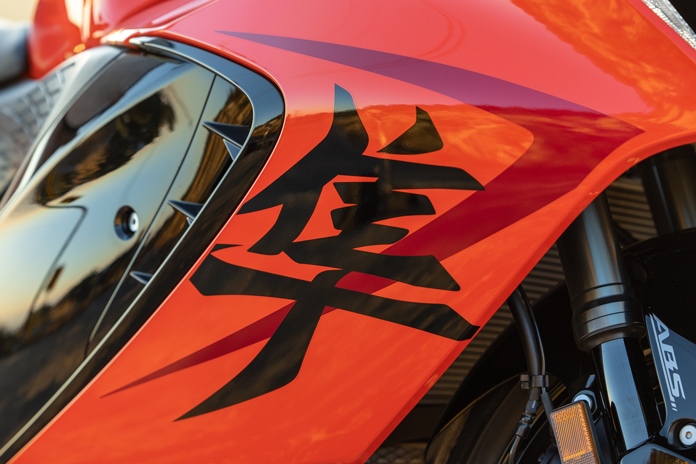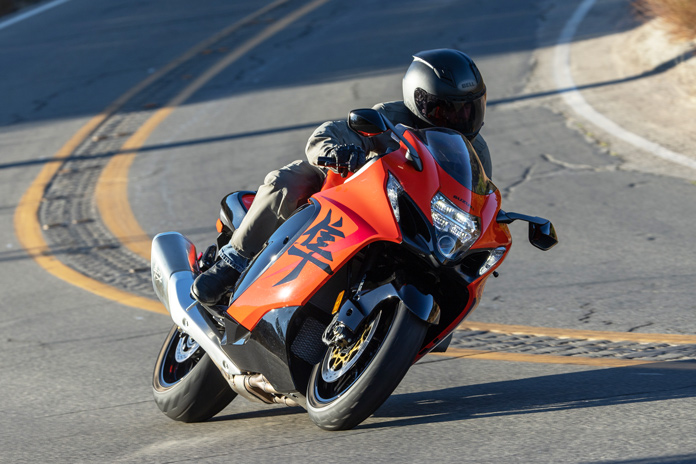
There are numerous glorious bikes on this planet, however there are only a few veritable icons. Of all of the Japanese bikes launched within the final 25 years, the Suzuki Hayabusa is probably most worthy of icon standing.
The sportbike paradigm shifted in 1999 when Suzuki launched the GSX1300R Hayabusa. It had probably the most highly effective engine in a manufacturing motorbike and aerodynamic bodywork that seemed like nothing else on the street.
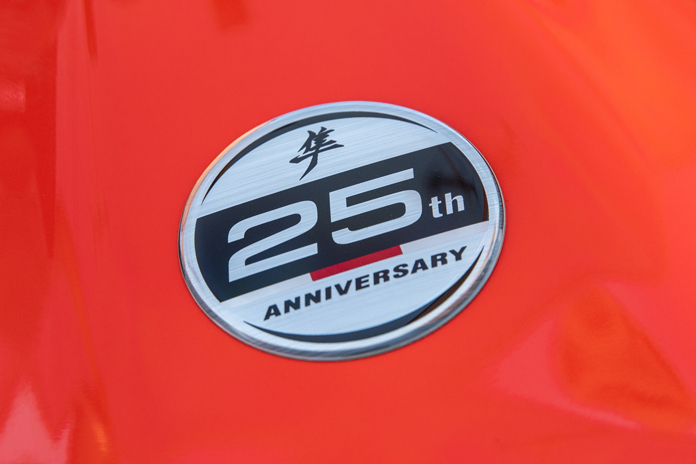
For 1 / 4 century, the Hayabusa has outlined what an ultra-fast motorbike needs to be. Greater than 200,000 Busas have discovered their manner into the fingers of speed-addled lovers, from lightning-quick dragracers to sport-touring experts who strap on baggage and blaze highways at blurring speeds.
Quick Design | Suzuki Hayabusa
There’s at all times been a necessity for velocity, and velocities ramped up in 1990 with the introduction of Kawasaki’s ZX-11, which may exceed 170 mph. Honda retaliated in 1996 with its CBR1100XX Tremendous Blackbird, which may hit 174 mph.
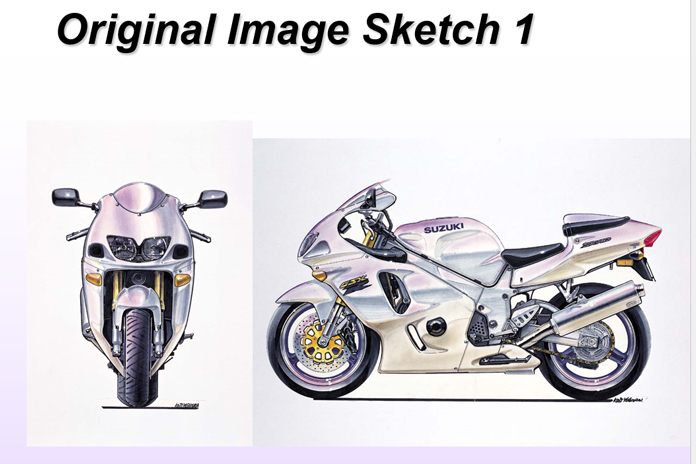
Suzuki needed in on this high-speed motion and commenced growing a monumental motorbike, with the objective of being “probably the most highly effective manufacturing bike on this planet, however on the similar time have usable, rider-friendly efficiency.” We weren’t fairly ready for the groundbreaking machine that emerged from Suzuki’s drawing boards.
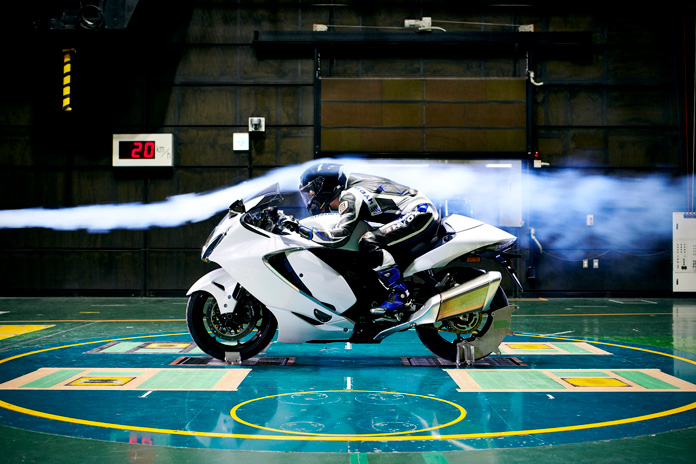
Massive velocity requires eager consideration to aerodynamics, so Suzuki’s new flagship would wish to slide cleanly via the air to grow to be the king of velocity. The quickest animal on this planet is the peregrine falcon, a hen famend for its capability to hit 200 mph throughout a steep dive.

The Japanese phrase for the falcon is “hayabusa,” and the kanji character for the phrase was emblazoned on the bike. Peregrine falcons generally eat blackbirds for lunch, and so would the motorbike that shares its Japanese identify.
On the bike’s launch in 1999, Suzuki proclaimed class-leading aero. The Busa’s bullet-shaped nostril featured a stacked headlight association to slender the bike’s frontal space. The entrance turnsignals had been built-in into the nostril to assist funnel air to the pressurized airbox to spice up energy at excessive speeds.
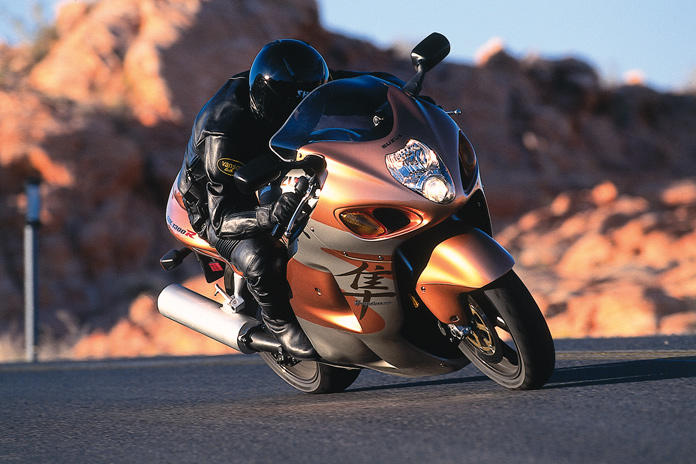
The Busa’s chassis was extra standard: a twin-spar aluminum body with an inverted fork and a monoshock, each totally adjustable. Offsetting the bike’s 550-lb curb weight was a 24.2-degree rake (the steepest within the class) and a mere 3.9 inches of path. A 58.5-inch wheelbase and a steering damper helped present high-speed stability. The entrance brakes featured 6-piston Tokico calipers biting on 320mm discs.
Quick and Livid | Suzuki Hayabusa
Suzuki used classes discovered in growing its GSX-R motors, utilizing 81mm forged-aluminum pistons reciprocating over a 63mm stroke to yield 1,299cc. The Busa additionally featured gas injection, a novelty in that period, and an air injection system minimized emissions with out hurting efficiency. A 4-2-1-2 exhaust included a catalytic converter to maintain it EPA-legal. A gear-driven counterbalancer diminished vibration.
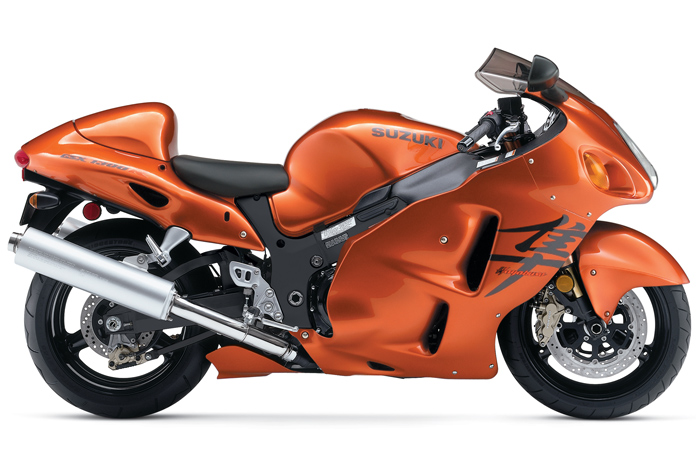
Suzuki blew us away with an unprecedented 173 crankshaft horsepower. That quantity dwarfed the GSX-R1100W’s output by 20 horses and simply outgunned Honda’s Blackbird. Put all of it collectively, and the Busa was capable of attain an astounding 194 mph when examined by Cycle World.
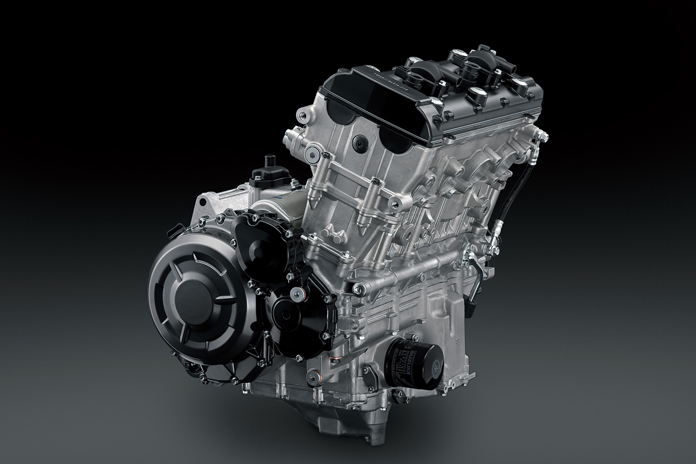
I acquired my first crack on the Busa in 1999 and was thrust into hyperspace. “It’s mind-bendingly quick,” I wrote, “and the explosions contained in the engine really feel like little sticks of dynamite are being fed via the consumption valves, igniting the combination with higher power than what had been thought-about attainable from a manufacturing streetbike.”
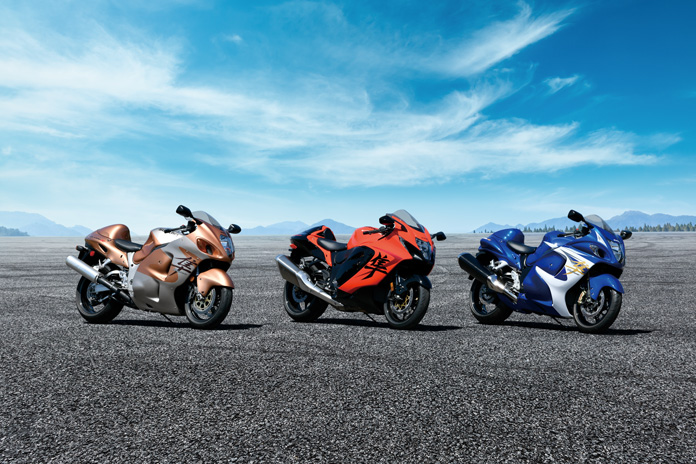
Throughout dyno testing, the motor piled on at the least 20 hp each 1,000 rpm from 2,500 to 7,500 rpm! Moreover, it generated 73 lb-ft at simply 2,500 rpm, the identical torque as Yamaha’s 1999 YZF-R1 made at its peak. Describing the Busa as “quick” is like calling the Sistine Chapel “fairly.”
Additionally spectacular was the bike’s end high quality, which exceeded most different Suzukis of the period. Its 10-disc back-torque limiting slipper clutch was stout, and its 6-speed gearbox shifted exactly.
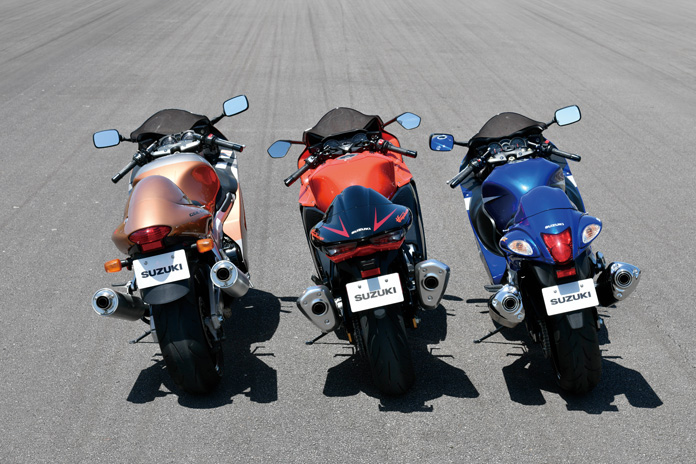
Quick Restrict | Suzuki Hayabusa
Kawasaki didn’t like Suzuki stealing the top-speed throne and retaliated in 2000 with the 178-hp ZX-12R. Surprisingly, it may solely attain a high velocity of 186 mph. That’s after we discovered that producers had voluntarily agreed to an arbitrary velocity restrict of 300 kph (186 mph) to keep away from potential rules on sportbikes. The highest-speed wars ended by unofficial decree.
In the meantime, the Hayabusa saved on rolling because the poster baby for motorbike extra. Wild customized paint jobs lined the Busa’s distinctive bodywork, turbos and nitrous kits had been added, and prolonged swingarms with fats tires grew to become all the fashion.
However it wasn’t simply sportbike jockeys who appreciated the Hayabusa’s easy velocity. Vacationers who wanted to get to faraway locations in a rush usually selected Busas as sport-touring rigs, creating the hypersport-touring area of interest.
The Busa’s rivals had been vastly overshadowed by its huge impression on this market – greater than 115,000 Gen 1s had been bought. The Blackbird’s run led to 2002. Kawasaki revamped its 1,198cc ZX-12R in 2002, nevertheless it wasn’t capable of elbow its manner into the Busa’s dominance amongst velocity freaks.
Quick Reignition: Gen 2 | Suzuki Hayabusa
Kawasaki killed off the 12R and changed it in 2006 with the ZX-14. It was a worthy challenger however lacked the Busa’s rowdiness and road cred. The slugfest escalated in 2008 when Kawasaki launched the ZX-14R and Suzuki gave the Busa its first vital makeover.
Associated: 2008 Suzuki Hayabusa vs. Kawasaki ZX-14 – Comparability Evaluate
The engine’s displacement was bumped to 1,340cc by growing its stroke 2mm. Lighter and stronger solid pistons bumped compression as much as 12.5:1, and a solid crank spun chromoly rods shot-peened for additional energy. Up high had been 16 titanium valves, and new camshafts provided higher raise and revised timing. Cam-chain stress was converted to a hydraulic system.
Suzuki claimed a 12% enchancment in horsepower, stretching to 194 hp on the crankshaft, a 21-horse increase. Torque was bumped 8.5% to 114 lb-ft. Harnessing the larger energy was a revised clutch that provided higher suggestions and employed the Suzuki Clutch Help System.
Modest chassis tweaks included fork sliders with a DLC coating to reduce stiction, a stiffer swingarm, and upgraded Brembo 4-piston radial calipers. Refreshed bodywork featured smoother physique panel joints with hidden fasteners and a tailsection with built-in turnsignals that had been mentioned to evoke a jet-engine exhaust.
The bike seemed sharper and extra trendy with out shedding its distinctive look, nevertheless it was saddled with a pair of ungainly triangular mufflers – a product of recent emissions requirements. Curb weight went up by 7 lb, and so did gross sales of aftermarket exhaust programs.
Ergonomic tweaks consisted of a decrease gas tank so riders may higher tuck behind the taller windscreen and a lowered rear subframe with a plusher rear seat. The tailsection included attachment factors for securing baggage, and the realm underneath the solo-seat hump provided further storage.
The revised Busa was sooner, dealt with higher, and stopped with extra authority, and it provided steering that was extra impartial and direct than the formidable ZX-14R. As normal, the Busa impressed with its easy energy output. In Rider’s 2008 comparability take a look at, Invoice Stermer quipped: “Being in a dither about whether or not they make extra energy is like questioning if Jennifer Lopez can be extra enticing if she parted her hair in a different way.”
Quick Cash | Suzuki Hayabusa
Motorbike gross sales had been on an unprecedented upward surge through the 2000s. Hayabusas had been hovering off showroom flooring, and aftermarket help was sturdy.
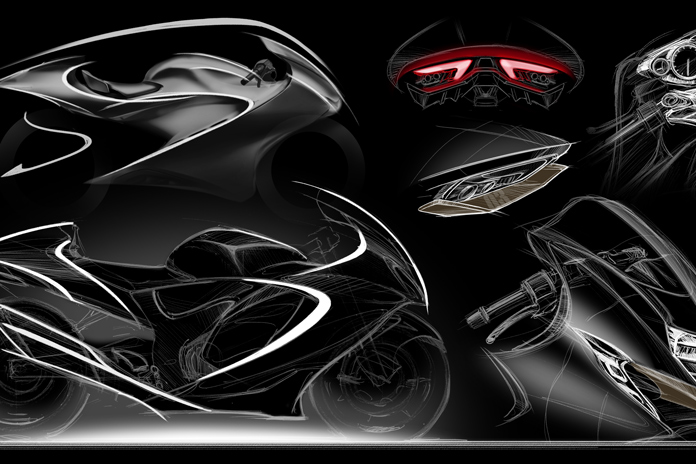
However then the Nice Recession hit, and motorbike gross sales dropped by greater than half virtually in a single day. The battles for hyperbike supremacy took a hiatus till 2012 when Kawi unveiled a brand new ZX-14R, which packed 1,441cc of warmth that trumped the Busa on the dyno by 17 hp. However the Suzuki was 11 lb lighter and was capable of give its rival a run for the cash. I logged a blistering 9.8-second E.T. on the Busa on the dragstrip, only a tenth behind the Kawi.
As recessionary forces continued to depress the moto market, the colourful hyperbike scene pale.
Quick Gen 3 | Suzuki Hayabusa
The Busa’s third technology was launched in Could 2021 and labeled “The Refined Beast.” Billed as a 2022 mannequin, it obtained a styling replace but was unmistakably a Hayabusa. Suzuki slathered its new hyperbike with the newest know-how and priced it at $18,599.
Associated: 2022 Suzuki Hayabusa | Highway Check Evaluate
By no means earlier than may you get a Busa with TFT instrumentation, cruise management, a bi-directional quickshifter, or traction management, however these all grew to become normal tools. Brakes acquired an improve with the addition of Brembo’s vaunted Stylema calipers paired with 320mm discs and cornering ABS. The Busa’s IMU-based electronics bundle consists of six using modes and adjustable traction management, engine braking, and wheelie management, together with launch management and hill-hold management.
In homage to the unique, the brand new Busa’s instrument panel consists of analog gauges that, as in 1999, use stepper motors to ratchet up the needles to their max values when the ignition is switched on. A small TFT show sits within the middle.
The engine structure and displacement carried over into Gen 3, however most inside elements had been lightened, strengthened, or refined for much less friction. Cam profiles had been revised to scale back valve raise overlap and assist obtain Euro 5 emissions requirements. A brand new exhaust system shaved 4.5 lb, bringing the bike’s curb weight to 582 lb.
Suzuki charges the 1,340cc inline-4 at 188 hp, down 6 ponies from earlier however with further low- and midrange energy. After we examined the Busa on Jett Tuning’s dyno, it generated a vigorous 173 hp and 106 lb-ft of torque at its rear tire.
Quick 25 | Suzuki Hayabusa
It’s exceedingly uncommon when a motorbike mannequin endures for 1 / 4 century, so Suzuki celebrated the milestone with a particular Twenty fifth Anniversary Version Hayabusa in 2024. It incorporates a particular Glass Blaze Orange / Glass Sparkle Black paint scheme, a Twenty fifth-anniversary emblem atop the gas tank, and anniversary logos etched on every muffler.
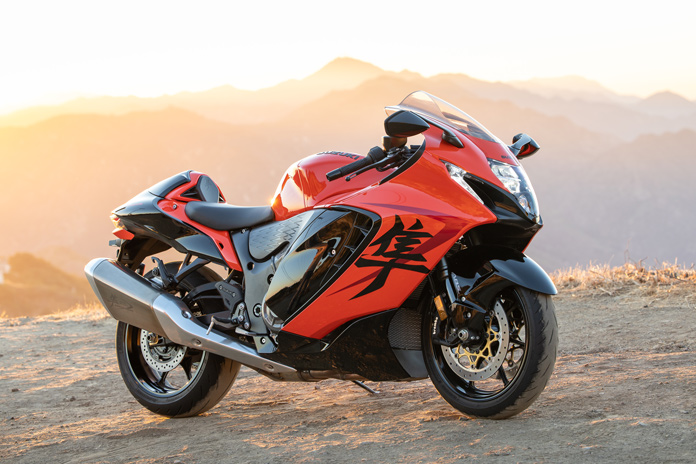
I had the respect of placing some miles on one and revisiting the majesty of the venerable Busa. As normal, the engine is so all-powerful that it makes the numbers on the speedo appear to be they’re in kilometers per hour somewhat than mph. Touring at 100 mph is completely easy, so riders have to maintain a watchful eye on the speedo or threat operating afoul of velocity limits. First gear alone will take you to 85 mph.
The bike reveals assured and secure dealing with, and the stiff chassis responds instantly with none flex. The KYB suspension is well-dialed, and the 31.5-inch seat retains the cushiness of earlier Busas, however there’s not a lot room between the saddle and the excessive footpegs. The attain for the bars is comparatively lengthy, however the fairing presents glorious wind safety for a sportbike. Its 5.3-gallon tank presents a touring-worthy 200 miles of vary.
Quick Legacy | Suzuki Hayabusa
The Hayabusa’s 25-year run proves that nothing exceeds like extra. The Busa’s legendary lump of an engine continues to thrill riders immediately, and it has confirmed to be virtually unkillable – some homeowners have racked up six-figure mileage on the odometer.
However the Busa is extra than simply one of many quickest earth-bound missiles ever created. Its bulbous and clean styling, which beforehand seemed virtually cartoonish, has grow to be a staple of sportbike design and continues to impress passersby. Whereas the Hayabusa is overkill for tight twisty roads, its cocktail of velocity and elegance makes for top ranges of pleasure on wide-open asphalt from coast to coast.
We’re cautious of utilizing the time period “icon” to explain a motorbike, however the phrase actually matches in relation to Suzuki’s unbelievable Hayabusa. The king nonetheless reigns.


